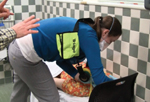|
By Megan Fink
Public Relations
A surge of patients with unknown symptoms rush into the emergency room waiting area demanding immediate treatment. Commotion ensues making it difficult to hear and gather information, all the while two mannequins simulating patients with severe injuries ominously lie across chairs waiting to be assessed. Time is of the essence for exercise participants, and patient lives are on the line.
This scenario was part of a disaster preparedness training exercise that several College of Medicine (COM) students and a representative from the local Veteran's Hospital Association (VA) experienced at the end of last month to test management and triage skills previously learned. Participants had six minutes to mitigate the scene, categorize patients according to their level of injury and gather information about the event itself. Participant response and recovery efforts were captured in real time and used in debriefing with the assistance of cameras in MUSC's Simulation Center, located in the College of Nursing, and a crew of experts in disaster medicine.
"It was an incredible opportunity to be exposed to disaster training in a way that you probably wouldn't have seen otherwise," said Steve Martin, COM fourth-year student. "Hopefully, we'll never have to use it, but it does create preparation."
The ultimate goal of this exercise is to demonstrate the feasibility of a disaster training course with a realistic, simulated hospital disaster. A short-term goal of this exercise is to assist the VA in the development of a national educational standard and curriculum for emergency preparedness training, which currently doesn't exist. This training focuses not just on emergency responders, such as EMS and firefighters, but also on those who receive and treat wounded patients.
MUSC and the VA, along with five other hospitals and the Charleston Metro Chamber of Commerce who also are part of this training response network called the Center for Health Professional Training and Emergency Response (CHPTER ), are looking to see if technology-rich curriculum can actually save lives.
"CHPTER is a communitywide phenomenon," said Lancer Scott, M.D., Emergency Medicine assistant professor and CHPTER director. "It's seven hospitals working together to provide disaster training for patient providers, not just physicians and nurses, but to anyone that would throw a blanket over a patient during a disaster." According to Scott, this training shows actual performance, not just knowledge of disaster medicine.
The need for training such as this is great. South Carolina was given a grade "C" for disaster preparedness by the American College of Emergency Physicians due primarily to the low number of nurses that receive training. Charleston has additional vulnerabilities to terrorism being a port city.
On March 13, CHPTER will help train approximately 20 subject matter experts from the VA. They are task with reviewing the course and reporting back their findings. This will hopefully lead to further demonstrations, construction of a national standard for emergency preparedness training and the application of training to nationwide providers. |



